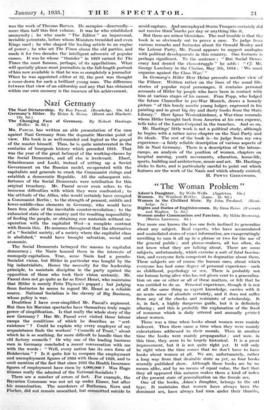Nazi Germany
The Changing Face of Germany. By Robert Hastings. (Muller. 3s. 6d. ) The Changing Face of Germany. By Robert Hastings. (Muller. 3s. 6d. ) Ma. PASCAL has written an able presentation of Cie case
against Nazi Germany from the dogmatic Marxian point of view. His book is as well-rounded and logical as the gospel
of the master himself. Thus, he is quite uninterested in the centuries of bourgeois history which preceded 1918. That was the year of the great betrayal of the working-classes by the Social Democrats, and all else is irrelevant. Ebert, Scheidemann and Loski, instead of setting up a Soviet Government on the Russian model, co-operated with the capitalists and generals to crush the Communist risings and establish a democratic Republic. All the subsequent mis- fortunes of the Social Democrats were retribution for this original treachery. Mr. Pascal never even refers to the immense difficulties with which they were confronted ; to the attitude of the Allies, who would certainly have occupied a Communist Berlin ; to the strength of peasant, middle and lower-middle-class elements in Germany, who would have been firm allies of the inevitable counter-revolution ; to the exhausted state of the country and the resulting impossibility of feeding the people, or obtaining raw materials without co- operation with the capitalist West—a complete contrast with Russia this. He assumes throughout that the alternative
of a " Socialist society, of a society where the capitalist class is abolished," would have brought salvation, social and economic.
The Social Democrats betrayed the masses to capitalist democracy ; the Nazis hoaxed them in the interests of monopoly-capitalism. True, some Nazis had a pseudo- Socialist vision, but Hitler in particular was bought by the big industrialists. Hence the necessity for the leadership principle, to maintain discipline in the party against the opposition of those who took their vision seriously. Mr: Pascal does not go quite as far as Ernst Henri, who maintains that Hitler is merely Fritz Thyssen's puppet ; but judging from footnotes he seems to regard Mr. Henri as a reliable source. National Socialism is the slavery of Big Business, whose policy is war.
Doubtless I have over-simplified Mr. Pascal's argirment. But then his Marxian spectacles have themselves truly magic power of simplification. Is that really the whole story of the new Germany ? Has Mr. Pascal ever visited those labour
camps the conditions of which he describes as " serf- existence " ? Could he explain why every employer of my
acquaintance finds the workers' " Councils of Trust," about which he is so scathing, far more difficult to handle than the old factory councils ? Or why one of the leading business men in Germany concluded a recent conversation with me
with the words : " Well, every nation has its own form of Bolshevism " ? Is it quite fair to compare the employment and unemployment figures of 1934 with those of 1929, and to omit mention of the fact that since 1932 the Health Insurance figures of employment have risen by 4,000,000 ? Was Hugo Stinnes really the admired of the National-Socialists ?
There are a number of errors of fact. For example, the Bavarian Commune was not set up under Eisner, but after his assassination. The murderers of Rathenau, Kern and Fischer, did not remain unscathed, but committed suicide to avoid capture. And unemployed Storm Troopers certainly did not receive three marks per day or anything like it.
But these are minor blemishes. The real trouble is that the book is so obviously out to prove a case. To judge from various remarks and footnotes about Sir Oswald Mosley and the Labour Party, Mr. Pascal appears to suggest analogies with political developments in this country. One footnote is perhaps significant. To the sentence : " But Social Demo- cracy had denied the class-struggle " he adds : " Cf. Mr. George Lansbury in the Clarion, May 5th, 1934: We must organize against the Class War.' " In Germany's Hitler Herr Heinz presents another view of the Ffihrer. Written rather on the lines of the usual life- stories of popular royal personages, it contains personal accounts of Hitler by people who have been in contact with him at various stages of his career. Frau Popp, who lodged the future Chancellor in pre-War Munich, draws a homely picture " of this lonely ascetic young lodger, engrossed in his painting and in great big dry and dusty books from the State Library." Herr Ignaz Westenkirchner, a War-time comrade whom Hitler brought back from America at his own expense; tells tales of the Lance-Corporal in the trenches. And so on.
Mr. Hastings' little work is not a political study, although he begins with a rather naive chapter on the Nazi Party and its ideals. The rest of the book is—to judge from my own. experience—a fairly reliable description of various aspects of life in Nazi GerMany. There is a description of the labour- camps, an analysis of the position of women, chapters on hospital nursing, youth movements, education, home-life, sports, building and architecture, music and art. Mr. Hastings sticks to facts, and is particularly careful to point out which features are the work of the Nazis and which already existed. H. POWYS GREENWOOD.






































 Previous page
Previous page